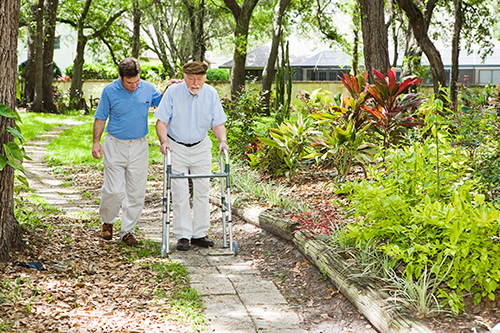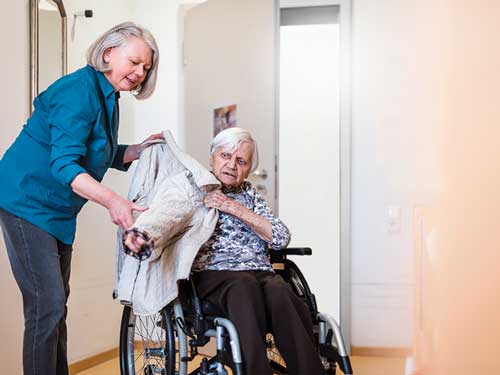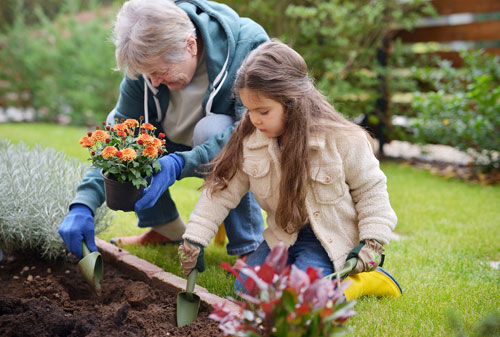




There are many types of care home settings that are used to support individuals at different stages of their life journey. This includes:
Mae llawer o wahanol fathau o gartrefi gofal yn cael eu defnyddio i gefnogi unigolion ar gamau gwahanol o'u bywyd. Mae’r rhain yn cynnwys:

Older individuals may need to move into a care home setting for various reasons. Older individuals can become frail due to their age increasing the risk of accidents and therefore putting themselves at risk of injury.
They may also experience poor health due to age-related conditions such as physical conditions. These can include, arthritis, glaucoma, stroke and cardiovascular disease etc., or mental health conditions such as dementia and depression. Physical conditions such as having a stroke or arthritis can affect an older individual’s ability to perform daily tasks such as washing and dressing, therefore they may require extra support. Mental health conditions such as dementia can affect an older individual’s ability to remember simple things, such as if they have left a saucepan on the stove or remembering their way home from the shops. This could cause an array of issues if they were living on their own.
A change in an older individual’s personal circumstances can create a need for more support in a care home setting. Changes in circumstances such as home-carers no longer being able to cope at home or because of the death of a spouse or partner who helped with care.
Efallai y bydd angen i unigolion hŷn symud i gartref gofal am amrywiol resymau. Gall unigolion hŷn fod yn fregus gan iddynt fod yn fwy tebygol o gael damweiniau, ac felly'n rhoi eu hunain mewn perygl o gael eu hanafu.
Gallant hefyd brofi iechyd gwael oherwydd eu hoedran megis cyflyrau corfforol. Gall y rhain cynnwys arthritis, glawcoma, strôc a chlefyd cardiofasgwlar ayyb, neu gyflyrau iechyd meddwl megis dementia ac iselder. Gall cyflyrau corfforol fel dioddef o strôc neu arthritis effeithio ar allu unigolyn hŷn i gwblhau tasgau dyddiol fel golchi a gwisgo, o ganlyniad efallai y bydd angen cymorth ychwanegol arnynt. Gall cyflyrau iechyd meddwl fel dementia effeithio ar allu unigolion hŷn i gofio pethau syml, fel os ydynt wedi gadael y sosban ar y stôf, neu’r ffordd adref o’r siop. Gall hyn achosi pryder mawr pe tasai’r unigolyn yn byw ar ei ben ei hun.
Gall newid mewn amgylchiadau unigolyn hyn achosi angen am ragor o gefnogaeth mewn cartref gofal. Gall yr amgylchiadau yma gynnwys, gofal yn y cartref yn methu ac ymdopi rhagor, marwolaeth gŵr, gwraig neu bartner a fuodd o gymorth gyda’r gofal.

Care homes can be very positive for some older individuals as they can ensure people have their needs met and make people feel more secure.
Positive features can include:
Gall cartrefi gofal fod yn gadarnhaol iawn ar gyfer rhai unigolion hŷn gan ei bod yn sicrhau eu bod yn bodloni anghenion ac yn gwneud i bobl deimlo’n ddiogel.
Gall nodweddion cadarnhaol gynnwys:

There are various professionals that may provide support to individuals in care home settings, these include:
General Practitioner (GP)
GP’s diagnose and treat people with illnesses. They also provide advice to older individuals to improve health, such as advice on diet, managing their health issues and providing medication.
Occupational Therapist (OT)
An occupational therapist helps older individuals to overcome the effects of disability and helps to prevent further disability. The disability may be physical or psychological. They prepare individual therapy programmes and may advise people on specialist aids or equipment that an individual may need in order to improve their health or mobility.
Physiotherapist
A physiotherapist is someone who helps to treat disease, injury, or deformity by physical methods such as massage, heat treatment, and exercise. They maintain health for people of all ages and can help older people remain independent for longer.
Podiatrist
A podiatrist is someone who treats feet and abnormal conditions associated with the feet, these include: toenail problems, such as thickened toenails, fungal nail infections or ingrown toenails, corns and calluses.
Dietician
Dietitians are qualified health professionals that assess, diagnose and treat dietary and nutritional problems. They can plan diet plans for older people for various reasons such as obesity, heart disease and so on.
Speech and language therapists (SALT)
Speech and language therapist work with older individuals who have various levels of speech, language and communication problems, such as:
District nurses
District nurses work out in the community and support older people with regards to their health. They may change dressings, give injections, take blood pressure and provide general health advise amongst other things.
Social workers
Social workers can help older people in many ways by identifying any care needs that they may have and if needed suggest services and support to address these needs. They may help with financial issues, medical care, mental disorders, and social problems.
Advocates
An advocate is someone who talks on someone else’s behalf. In the case of older people, they may not be able to make decisions for themselves any longer due to dementia or other issues, so an advocate would make decisions for them, so that it is in their best interest.
The following can also provide support to individuals in care homes:
Mae amrywiaeth o weithwyr proffesiynol a all roi cymorth i bobl mewn cartrefi gofal, gan gynnwys:
Meddyg teulu (GP)
Mae meddygon teulu yn rhoi diagnosis ac yn trin pobol sydd a salwch. Maent hefyd yn rhoi cyngor i bobl hŷn er mwyn gwella iechyd, megis cyngor ar ddeiet, rheoli problemau iechyd a rhoi meddyginiaeth.
Therapydd Galwedigaethol
Mae therapydd galwedigaethol yn helpu pobl hŷn i oresgyn effeithiau anabledd ac yn helpu i atal anabledd pellach. Gall yr anabledd fod yn gorfforol neu'n seicolegol. Gallant baratoi rhaglenni therapi unigol a rhoi cyngor i bobl ar gymhorthion neu gyfarpar arbenigol y gall fod eu hangen ar unigolyn er mwyn gwella ei iechyd neu symudedd.
Ffisiotherapydd
Mae ffisiotherapydd yn helpu i drin clefyd, anaf, neu anffurfiad drwy ddulliau corfforol fel tylino, triniaeth gwres, ac ymarfer corff. Maent yn cynnal iechyd pawb o bob oed a gallant helpu pobl hŷn i aros yn annibynnol am fwy o amser.
Podiatregydd
Mae podiatregydd yn trin y traed a chyflyrau annormal sy'n gysylltiedig â'r traed, fel: problemau ag ewinedd traed, megis ewinedd traed sydd wedi tewychu, heintiau ffwngaidd ar yr ewinedd neu gasewinedd (ingrown toenails), cyrn a chaledennau.
Deietegydd
Mae deietegwyr yn weithwyr iechyd proffesiynol cymwys sy'n asesu, yn gwneud diagnosis ac yn trin problemau'n ymwneud â deiet a maeth. Gallant gynllunio deiet ar gyfer pobl hŷn am resymau amrywiol fel gordewdra, clefyd y galon ac ati.
Therapyddion lleferydd ac iaith (SALT)
Mae therapyddion lleferydd ac iaith yn gweithio gyda phobl hŷn sydd â lefelau gwahanol o broblemau lleferydd, iaith a chyfathrebu, fel:
Nyrsys ardal
Mae nyrsys ardal yn gweithio yn y gymuned ac yn helpu pobl hŷn gyda'u hiechyd. Gallant newid gorchuddion clwyfau, rhoi pigiadau, mesur pwysedd gwaed a rhoi cyngor iechyd cyffredinol, ymhlith pethau eraill.
Gweithwyr cymdeithasol
Gall gweithwyr cymdeithasol helpu pobl hŷn mewn llawer o ffyrdd drwy nodi unrhyw anghenion gofal a all fod ganddynt ac, os oes angen, awgrymu gwasanaethau a chymorth i ddiwallu'r anghenion hynny. Gallant helpu gyda materion ariannol, gofal meddygol, anhwylderau meddwl a phroblemau cymdeithasol.
Eiriolwyr
Eiriolwr yw rhywun sy'n siarad ar ran rhywun arall. Yn achos pobl hŷn, efallai na allant wneud eu penderfyniadau eu hunain mwyach am fod ganddynt ddementia neu broblemau eraill, felly byddai eiriolwr yn gwneud penderfyniadau ar eu rhan, er eu budd.
Gall y canlynol hefyd fod o gymorth i unigolion mewn cartrefi gofal:

People’s lives can be transformed when they feel in control of their health and well-being and when they are able to shape their care, support and treatment to fit with what matters to them. Families are often crucial in supporting individuals to make these decisions. This can, in turn, help to optimise the individual’s well-being.
It is important for workers to ensure families feel welcome and that they are still an important part of their relative’s life. They should be able to support their family member in whatever way they can.
The role of the family is important in providing on-going care and support. Families can play a vital role in caring for older individuals in the home and to help them maintain their independence as long as possible. This could be done by providing personal care, taking their relative out and joining in activities with their loved one.
Family members can also help with areas such as finances. Some older adults will require more support and may need help with finances as they may no longer have the ability to do so themselves.
For individuals with dementia or those that do not have the full capacity to make care decisions for themselves, a family member may act as an advocate and speak on behalf of the older individual.
Families are able to provide invaluable insight and information that may help the care team who are responsible for the person that is being cared for. They are the people most likely to know the older individual's likes and dislikes; this will enable care home settings to provide more personalised care and help to ensure that the older individual's likes are met, and their dislikes are avoided.
Families can also provide a considerable amount of emotional support to older individuals. This can help ease the transition of going into care. Without emotional support, the likelihood of stress and anxiety increasing is high and in turn, this may contribute to depression and other forms of mental illness.
Gall bywydau pobl gael eu trawsnewid pan fyddant yn teimlo bod ganddynt reolaeth dros eu hiechyd a'u llesiant a phan allant lywio eu gofal, eu cymorth a'u triniaeth i gyd-fynd â'r hyn sy'n bwysig iddynt. Mae teuluoedd yn aml yn hanfodol wrth helpu unigolion i wneud y penderfyniadau hyn. Gall hyn, yn ei dro, helpu i wella llesiant yr unigolyn.
Mae'n bwysig i weithwyr sicrhau bod teuluoedd yn teimlo bod croeso iddynt a'u bod yn rhan bwysig o fywyd eu perthynas o hyd. Dylent allu cefnogi eu perthynas ym mha bynnag ffordd y gallant.
Mae'r teulu yn chwarae rôl bwysig wrth roi gofal a chymorth parhaus. Gall teuluoedd chwarae rôl hollbwysig wrth ofalu am unigolion hŷn yn y cartref a'u helpu i aros yn annibynnol gyhyd â phosibl. Gellid gwneud hyn drwy ddarparu gofal personol, mynd â'u perthynas allan ac ymuno â gweithgareddau gyda'u hanwylyd.
Gall aelodau o'r teulu hefyd helpu gyda phethau fel arian. Bydd angen mwy o gymorth ar rai oedolion hŷn ac efallai y bydd angen help arnynt gyda'u harian am nad ydynt yn gallu gwneud hynny eu hunain mwyach.
Yn achos unigolion â dementia neu'r rhai nad ydynt yn gallu gwneud penderfyniadau gofal drostynt eu hunain, gall aelod o'r teulu fod yn eiriolwr a siarad ar ran yr unigolyn hŷn.
Gall teuluoedd gynnig dealltwriaeth a gwybodaeth werthfawr a all helpu'r tîm gofal sy'n gyfrifol am yr unigolyn sy'n cael gofal. Y teulu sydd fwyaf tebygol o wybod beth mae unigolion hŷn yn ei hoffi a beth nad ydynt yn ei hoffi; bydd hyn yn galluogi cartrefi gofal i roi gofal mwy personol iddynt ac yn helpu i sicrhau bod dymuniadau'r unigolion hŷn yn cael eu parchu, a bod eu casbethau'n cael eu hosgoi.
Gall teuluoedd hefyd roi cryn dipyn o gymorth emosiynol i bobl hŷn. Gall hyn helpu i esmwytho'r broses o symud i gartref gofal. Heb gymorth emosiynol, mae tebygolrwydd uchel o straen a gorbryder a gall hyn, yn ei dro, gyfrannu at iselder a mathau eraill o salwch meddwl.